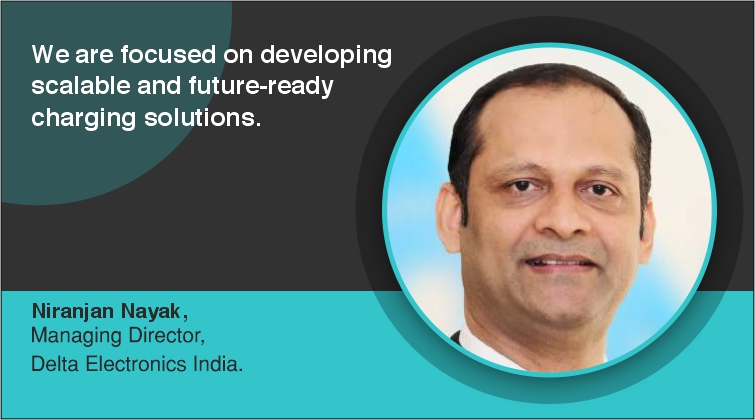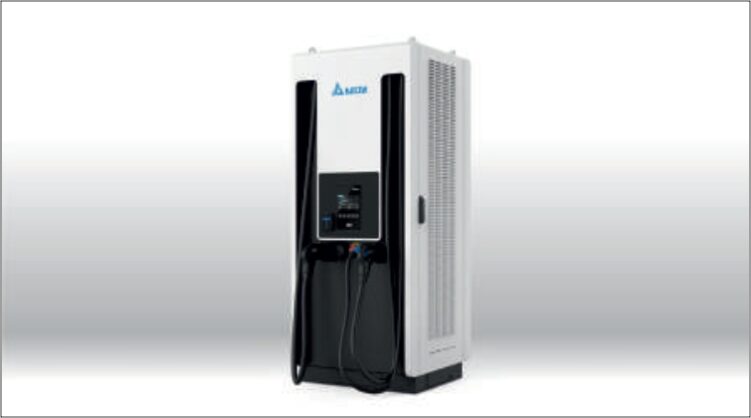Renewable energy fuels sustainable transportation through EV infrastructure
By EPR Magazine Editorial June 26, 2023 1:38 pm IST
By EPR Magazine Editorial June 26, 2023 1:38 pm IST

“We are focused on developing scalable and future-ready charging solutions.“
In an interview with EPR Magazine, Niranjan Nayak, Managing Director of Delta Electronics India, expounded on their aims of deploying advanced technologies and intelligent charge management systems to maximise energy, load control, and grid integration.
How are breakthroughs in EV battery technology revolutionising the range and performance of electric vehicles?
Breakthroughs in EV battery technology have revolutionised electric vehicles’ range and performance, acknowledging the crucial role of battery innovation in driving transportation electrification. Advancements in battery chemistry and materials have increased energy densities, allowing greater storage capacity in a smaller space. This extended electric vehicles’ driving ranges, reducing anxiety and enhancing practicality. Battery management systems have also improved efficiency and performance by monitoring temperature, charging rate, and energy utilisation. These advancements result in enhanced acceleration, longer-lasting performance, and improved reliability.
Fast-charging technologies have significantly reduced charging times, making electric vehicles more convenient. Combined with high-power charging infrastructure, these breakthroughs enable faster recharging, minimising downtime and enhancing the user experience. Ongoing research focuses on improving energy density, cycle life, and safety, with innovations like solid-state batteries and next-generation materials holding great promise for even higher energy densities, faster charging, and enhanced safety. These advancements transform electric vehicles’ range and performance, accelerating the transition to sustainable transportation.
At Delta Electronics, we are committed to pushing the boundaries of EV battery technology, driving transportation electrification, and contributing to a greener future.
What steps are being taken to expand the charging infrastructure network for electric vehicles rapidly?
Delta Electronics India is committed to rapidly expanding the charging infrastructure network for electric vehicles (EVs). To achieve this, we are taking several strategic steps. Firstly, we are collaborating with government bodies, utility companies, and other stakeholders to develop partnerships and jointly invest in expanding charging infrastructure. These collaborations enable us to leverage resources, expertise, and funding to accelerate the deployment of charging stations nationwide. Secondly, we are focused on developing scalable and future-ready charging solutions. Our charging infrastructure is designed to be compatible with various charging standards, ensuring accessibility and convenience for EV owners.
Additionally, we prioritise using advanced technologies and intelligent charging management systems that optimise energy usage, load management, and grid integration. By embracing smart grid integration, we can enable bidirectional energy flow between EVs and the grid, facilitating grid stabilisation, load management, and renewable energy integration. Through these initiatives, Delta Electronics India aims to establish a well-developed and accessible charging infrastructure network, supporting the widespread adoption of electric vehicles and fostering a sustainable transportation ecosystem.
How can the recycling and disposal of EV batteries be optimised to ensure sustainable and environmentally friendly practices?
Delta Electronics optimises EV battery recycling and disposal for sustainable practices. We collaborate with partners and institutions to develop advanced recycling technologies that recover valuable materials while minimising environmental impact. By reusing materials like lithium, cobalt, and nickel, we contribute to the circular economy and reduce raw material extraction. We advocate for proper collection and recycling through awareness campaigns, establishing centres, and partnering with recycling facilities for safe processing. Our sustainable design and manufacturing practice prioritise eco-friendly materials and adhere to international standards, minimising environmental impact. We actively participate in industry discussions, shaping regulations for EV battery management. Delta Electronics is committed to sustainable practices, optimising EV battery recycling for a greener future.
What role does government policy play in driving the development of advanced EV batteries and supporting the growth of EV charging infrastructure?
Government policy plays a crucial role in driving the development of advanced electric vehicle (EV) batteries and supporting the growth of EV charging infrastructure. At Delta Electronics India, we recognise government initiatives’ significance in accelerating electric mobility adoption. Firstly, government policies provide incentives and subsidies for research and development in advanced EV battery technologies. These incentives encourage manufacturers and research institutions to invest in innovation, leading to breakthroughs in battery chemistry, energy density, and overall performance. By supporting the development of advanced batteries, government policies drive the continuous improvement of EVs’ range, efficiency, and overall viability.
Secondly, government policies play a key role in establishing an enabling environment for expanding EV charging infrastructure. They provide regulatory frameworks, guidelines, and financial incentives encouraging private and public investment in charging stations. These policies help overcome barriers to entry and create a reliable and accessible charging network, boosting consumer confidence in EVs and addressing range anxiety concerns.
Moreover, government policies can include mandates for public institutions, commercial buildings, and residential complexes to provide EV charging facilities. Such policies create a supportive ecosystem that fosters the growth of EV charging infrastructure. Additionally, incentives for installing fast-charging stations along highways and major transportation routes promote long-distance travel and facilitate the widespread adoption of EVs.
How can integrating renewable energy sources with EV charging infrastructure contribute to a greener and more sustainable transportation ecosystem?
Integrating renewable energy sources with EV charging infrastructure is vital for a greener and more sustainable transportation ecosystem. Delta Electronics India recognises the significance of this integration in transitioning to clean and renewable energy for electric vehicles. By incorporating solar and wind power at charging stations, we utilise sustainable and carbon-neutral electricity for EV charging, reducing reliance on fossil fuels and minimising emissions. This integration enables smart charging, prioritises clean energy sources based on availability, reduces carbon footprints, and stabilises the grid. Furthermore, it allows for energy storage, utilising excess renewable energy during low production periods for EV charging, enhancing efficiency and reliability. Integrating renewable energy promotes energy independence, reduces dependence on traditional sources, and contributes to a resilient and sustainable transportation ecosystem.
What are the potential implications of EV battery standardisation and interoperability for adopting electric vehicles?
EV battery standardisation and interoperability drive India’s widespread adoption of electric vehicles (EVs). Delta Electronics India recognises their importance for market growth and compatibility.
Interoperability allows EVs to use interchangeable batteries across brands, eliminating the need for proprietary charging infrastructure. This enhances convenience, boosts consumer confidence, and promotes EV acceptance.
Battery standardisation supports robust charging infrastructure by enabling stations to accommodate diverse EVs without multiple interfaces. This simplifies deployment, encourages investments, and facilitates scalability.
Standardisation drives innovation, cost reduction, and healthy competition in the EV industry. It also promotes the second-life use of EV batteries for energy storage, contributing to sustainability.
Overall, EV battery standardisation and interoperability are crucial for EV adoption. Delta Electronics India actively supports these efforts to drive growth in India’s EV market.
How are emerging technologies, such as solid-state batteries and ultra-fast charging, poised to reshape the future of electric vehicles and charging infrastructure?
As the world transitions to electric vehicles, emerging technologies like solid-state batteries and ultra-fast charging hold the potential to reshape the future of electric vehicles and charging infrastructure. Delta Electronics India is actively involved in their development and deployment. Solid-state batteries offer several advantages over traditional lithium-ion batteries, including longer range, faster charging, and enhanced safety. By using a solid electrolyte instead of a liquid one, solid-state batteries are more durable and have a higher energy density, allowing them to store more energy in a smaller space. This extended range makes electric vehicles more practical for everyday use.
Ultra-fast charging, on the other hand, utilises high-power chargers to charge electric vehicles in minutes. This rapid charging capability enables EV owners to conveniently charge their vehicles during short stops at grocery stores or other public areas, significantly reducing charging time.
While these technologies are still developing, their potential impact on the electric vehicle market is substantial. By making electric vehicles more affordable, convenient, and accessible, they can accelerate the widespread adoption of electric vehicles and contribute to reducing greenhouse gas emissions. Delta Electronics India is committed to driving the development and deployment of these technologies to create a more sustainable transportation future.
For more details, visit: https://deltaelectronicsindia.com/
We use cookies to personalize your experience. By continuing to visit this website you agree to our Terms & Conditions, Privacy Policy and Cookie Policy.